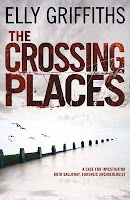Last night I went to Lowestoft Library's monthly book group meeting; the September edition. We were there to discuss
Afterwards by Rosamund Lipton. As usual, we tend to discuss everything other than the book, until someone asks the fateful question: "So what did everyone think of the book?" And as usual there was a short silence as people try to think of a diplomatic way to say that they didn't like the book.
The general consensus of the group was that Afterwards was not very good. Most people had read it all and a few people read some of it (but gave up because they were too frustrated with the story and/or characters) and, of course, there were those who didn't even bother to read it at all. I'm usually in the latter group, but I did get around to reading it all this time. Not because I particularly liked the story, and definitely not because I liked the characters, because I didn't like a single one of them. I read it in order to find out 'whodunnit'. I won't give away too much, but the main premise of the story is a school is set on fire, a teenage girl is in the building when it's on fire, the girl's mother goes in to rescue her, both the girl and the mother end up in hospital where they both have out of body experiences. The mother becomes the narrator and converses with her daughter throughout the whole novel. They try to work out who started the fire, and like any good mystery story, there were red herrings. We, as the reader, were taken from pillar to post, trying to work out 'whodunnit' and every time I guessed, I was wrong. And I was genuinely surprised by the person 'whodunnit'. So in that respect, it was good. But in all other respects, it wasn't.
It dragged. It was tedious and annoying and frustrating. If out of body experiences could actually happen, how likely could two people do it at the same time? And how likely would they be able to engage in conversation as if they were both in their bodies?
The characters were also annoying. The mother, who narrated the story, was irritating. She named her son Adam, but kept calling him Addie. I have no idea why you would give someone a name, and then 'shorten' it to something longer than the original name. And there was also a Penny and a Jenny, which was unnecessary.
I did, however, find a lovely little line in the book which sat well with me. Grace, the mother, is talking about Adam, her son, and says, "He was prepared for unhappy endings, but not unjust ones." I know most people would have skipped over that line, but that's how I feel a lot of the time. But that's by the by.
The highlight of the evening was the delicious lemon and rosemary cake that one of the members brought it, as a celebration for being made redundant and not having to go to work anymore.
The lowlight of the evening came at the end of the group meeting when everyone left to go home. Across the road from the library is a public carpark. It's free to park there after 6pm, so it's a pretty convenient place to park for the book group, which starts at 7pm. As I pulled into the carpark last night I noticed that there was a fence around the perimeter and a sign by the entrance which stated that the carpark would be closed from the 26th to the 28th of September. As yesterday was the 25th, and as there were already some cars parked in the carpark, I parked there as usual. Other members of the group parked there, as usual, and we didn't worry about anything as the carpark wasn't going to be closed until the 26th.
At 9pm, when we had finished briefly discussing the book and seriously putting the world to rights, we all left to go to the carpark and go home. As we approached the carpark (which contained at least 10 cars) we noticed that the fence had been pulled across the entrance and locked with a chain and padlock.
Thankfully, the caretaker was still in the library and he opened the doors so we could go back inside to keep warm. Someone called someone from the council who eventually came and unlocked the carpark. I've never seen a group of people rush to their cars and drive out of the carpark so quickly. No-one wanted to be locked in.
Why would anyone lock cars inside a carpark, especially when the sign said that it would be closed on the 26th?
Our next book is The Picture of Dorian Gray by Oscar Wilde. I'm very pleased about this, as this is one of the many books on my 'to read' list. I just hope I enjoy it. Well, it can't be much worse than this month's attempt at literature!









